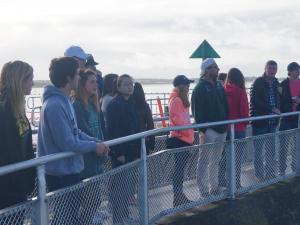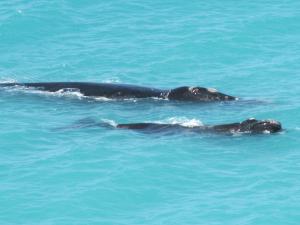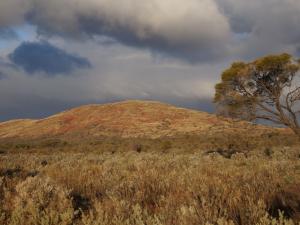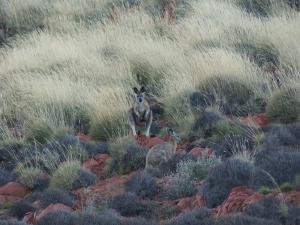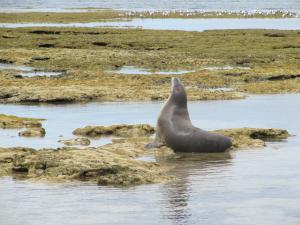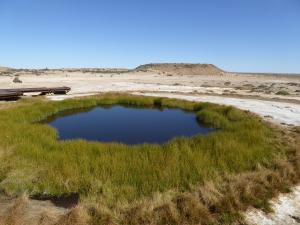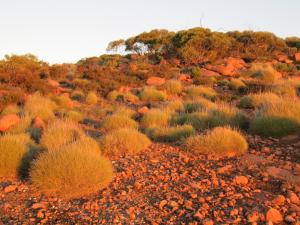Research
We undertake a wide range of research projects addressing the relationships between adaptation, community and the environment.
Here are some examples of our ongoing projects.
-
Sharks and aquaculture
This project investigates how marine stakeholders feel about sharks and aquaculture in South Australia. We are conducting interviews with various groups and individuals across the State. One the key aims is to try and understand where stakeholders get their communication and how policymakers can therefore build appropriate communications about issues such as new aquaculture developments.
This project was funded by South Australian Research Development Institute (SARDI), and was a sub component of a wider FRDC project.
-
Seals and fishers
This project investigates the perceptions that fishers (seafood and aquaculture) and marine stakeholders have about the presence of seals on their economic livelihoods. While seals were almost hunted to extinction, they are now increasing in numbers and eating from the same fish stocks as many fishers. On the other hand, seal watching and swimming with seals is emerging as an economically important enterprise.
This project was funded by South Australian Research Development Institute (SARDI), and was a sub component of a wider FRDC project that is investigating the overall relationship between seal species and commercial fishing.
Assessing the social impact of seals
South Australia is an important region for seal biodiversity but the sealing era in the 1800s almost decimated seal populations. In the last 30 years, fur seal numbers have increased and with that recovery there has been an associated impact on fisheries and finfish aquaculture. This project set out to understand the nature of those interactions and members of ACE, particularly Melissa Nursey-Bray assisted in the identification of the social and cultural impacts of seals on marine stakeholders in South Australia.
-
Developing social and economic indicators for the marine scale fishery
The Marine Scale Fishery (MSF) is a very diverse fishery. Yet fish stocks are declining and there is increasing community led demand for solutions to what is emerging as a difficult management issue. This project seeks, by talking to the different fishers across the State of South Australia to try and build some suggestions for structural reform but also to develop some economic and social indicators that can be used in ongoing policy frameworks.
This project is funded by the Fisheries Research and Development Corporation (FRDC).
-
Old ways for new days: indigenous peoples and climate change adaptation
Indigenous peoples are facing multiple challenges resulting from climate change. This project aims to develop understanding of Indigenous perspectives about climate change, how they are building adaptation responses, and how Indigenous and other communities can work together. Outputs will include a number of papers, a website, and a book.
This project is funded by the National climate Change Adaptation Research Network.
Co-led by Associate Professor Melissa Nursey-Bray and Phil Rist, CEO Girringun Aboriginal Corporation, we conducted a series of activities and studies that explore Indigenous agency, climate adaptation and the interface between Indigenous knowledge and climate science. This has led to a range of outputs including the following open access articles and a commentary in the online magazine ForeGround. We are also co-authoring a book on Indigenous Adaptation to be published in 2020, with 4 Indigenous authors.
Journal Local Environment
Overview: This paper explores how Australia's Indigenous peoples understand and respond to climate change impacts on their traditional land and seas. Our results show that: (i) Indigenous peoples are observing modifications to their country due to climate change, and are doing so in both ancient and colonial time scales; (ii) the ways that climate change terminology is discursively understood and used is fundamental to achieving deep engagement and effective adaptive governance; (iii) Indigenous peoples in Australia exhibit a high level of agency via diverse approaches to climate adaptation; and (iv) humour is perceived as an important cultural component of engagement about climate change and adaptation. However, wider governance regimes consistently attempt to “upscale” Indigenous initiatives into their own culturally governed frameworks - or ignore them totally as they “don't fit” within neoliberal policy regimes. We argue that an opportunity exists to acknowledge the ways in which Indigenous peoples are agents of their own change, and to support the strategic localism of Indigenous adaptation approaches through tailored and place-based adaptation for traditional country.
Journal Heliyon
Indigenous peoples are going to be disproportionately affected by climate change. Developing tailored, place based, and culturally appropriate solutions will be necessary. Yet finding cultural and institutional ‘fit’ within and between competing values-based climate and environmental management governance regimes remains an ongoing challenge. This paper reports on a collaborative research project with the Arabana people of central Australia, that resulted in the production of the first Indigenous community-based climate change adaptation strategy in Australia. We aimed to try and understand what conditions are needed to support Indigenous driven adaptation initiatives, if there are any cultural differences that need accounting for and how, once developed they be integrated into existing governance arrangements. Our analysis found that climate change adaptation is based on the centrality of the connection to ‘country’(traditional land), it needs to be aligned with cultural values, and focus on the building of adaptive capacity. We find that the development of climate change adaptation initiatives cannot be divorced from the historical context of how Arabana experienced and collectively remember colonisation. We argue that in developing culturally responsive climate governance for and with Indigenous peoples, that that the history of colonisation and the ongoing dominance of entrenched Western governance regimes needs acknowledging and redressing into contemporary environmental/climate management.
Foreground
"Not passive victims: Indigenous Australians respond to climate change"
Overview: Climate change is disproportionately threatening the cultures and health of Indigenous peoples globally. With intimate knowledge of Country, Indigenous Australians are actively adapting to challenges, finding opportunities for new initiatives and alliances to strengthen cultural practices.
-
Developing a typology of urban values about vegetation for urban planning
Vegetation, or green spaces within cities, have multiple environmental and health benefits not only creating micro climates that reduce temperature but also playing a vital role in reducing heat stress, biodiversity loss and food security. Vegetative spaces, or the urban ecology of a city are thus, in a climate context, an integral part of any urban adaptation and mitigation program.
With ongoing migration and urban development, community values about urban vegetation in our cities are variable and contested. In this context, this project seeks to evaluate (for Adelaide City): (i) how to document community values about urban vegetation, and (ii) understand, in the context of trying to achieve carbon neutral status, what role and influence these values play in achieving that goal. Situated within the fields of geography, climate change adaptation, sociology, history, law, health and planning, this study builds on previous research about urban values about nature (Niemela 2014, Birch and Wachter 2008, Irvine et al. 2010, Jabareen 2006, Jim and Chen 2006, Lo and Yin 2010, Morancho and Bengochea 2003, Swanick et al. 2003). Results will include development of a values typology for urban planning.
-
Academic flying
We undertook a project that sought to understand aspects surrounding the sustainability of academic flying. Results were published in an article called “The Fear of Flying” and can be found here:
Abstract
Universities are both disseminators and producers of the climate knowledge needed to institute the social and cultural change required for climate adaptation and mitigation to occur. They also have the opportunity to lead and model pro-environmental behaviour, yet often have large carbon budgets, partly caused by staff travel. This paper explores this topic via an institutional case study of what factors motivate the academic community to undertake plane travel and the implications this has for wielding wider societal influence in terms of pro-environmental behaviour. We report on a year-long qualitative social science study of academic plane travel at the University of Adelaide, South Australia where we investigated the tension between academic requirements to travel and the institution’s formal commitment to sustainability within the Campus Sustainability Plan. We found that, while many academics were worried about climate change, very few were willing to change their current practice and travel less because they are not institutionally incentivized to do so. There is a fear of not flying: plane travel is perceived as a key driver for career progression and this is an ongoing barrier to pro-environmental behaviour. We conclude that institutional and political change will be required for individual change to occur and sustainable agendas to be met within academic communities.

